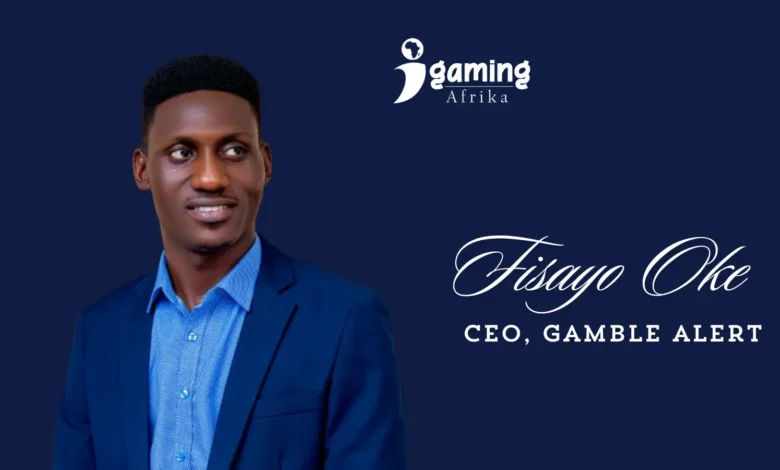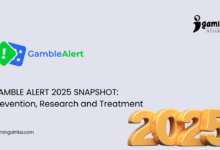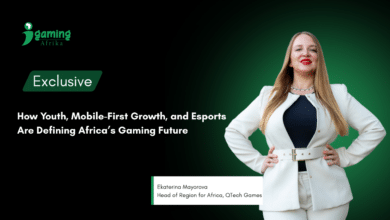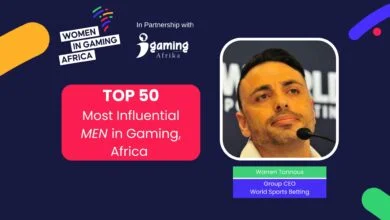Exclusive: Guardian Angels of the Game – Empowering Responsible Gaming in Africa

Join us on a journey into the world of responsible gambling advocacy as we sit down with Fisayo Oke, Member of the Board of Trustees and Chief Executive Officer of Gamble Alert. In an exclusive interview with iGaming AFRIKA,
Fisayo shares insights into Gamble Alert’s mission and its transformative impact on gambling culture across Africa. From grassroots outreach to pioneering interventions, discover how Gamble Alert is spearheading a safer and more sustainable gaming landscape for all.
IGA: What was the driving force that inspired you to create Gamble Alert three years ago?
Fisayo: As I began to understand the dynamics of the gaming industry, I saw many youths in my community spending all they had in the hope that the gambling odds would be in their favour. Soon enough, I saw how these once-hopeful people went into debt and dejection and were reduced from financial buoyancy to abject poverty. I was immediately concerned that what should be entertainment may just be putting the people in harm’s way.
Gamble Alert was born from a deep-rooted belief in the power of compassion, understanding, and support. My mission, and indeed that of my teammates, is to be the guiding light in the lives of those struggling with gambling addiction, to offer hope when all seems lost, and to extend a helping hand.
Our work in the past three years has cut across research (for evidence-based intervention), education programs (for prevention of gambling harms), and provision of counselling support.
IGA: You have repeatedly highlighted the importance of responsible gambling and player protection. Can you share some insights into the current landscape of responsible gambling in Africa and the key challenges facing the industry in this regard?
Fisayo: In many African countries, the regulation of online gambling is still in its infancy. It is interesting to see that governments across the continent are beginning to develop regulatory frameworks tailored toward responsible gaming within their national context. The effectiveness of these frameworks, however, varies.
In its move to introduce new measures to prevent gambling addiction, the Kenyan government has banned outdoor and social media advertisements of gambling. The Nigerian government mandates gaming operators to ensure that no advertising strategies should promote unrealistic expectations. It also mandates licensed gaming operators to offer Nigerian players the ability to self-exclude. In South Africa, there is the National Responsible Gambling Programme, a resource that integrates research and monitoring, treatment and counselling, public education and awareness, as well as industry training.
Currently, there is a lack of consensus regarding the parameters of responsible gambling. There seems to be no common framework that is guiding responsible gambling efforts across the continent.
For instance, the boundaries of responsibility for gambling-related harms among government, industry, and consumers remain blurred. Also, segments of the gambling industry harbour concerns that research might reveal information that is not in its best commercial interests. There is also minimal data describing the characteristics and natural history of gamblers who develop or avoid gambling-related harm. Consequently, it is difficult to determine with precision what evidence should be used to develop and direct prevention, early intervention, or treatment programs.
IGA: What are some of the initiatives or programs your organisation is engaged in to implement to raise awareness and educate the public about responsible gambling practices?
Fisayo: Our awareness programs include school advocacy tours (targeted at secondary schools across Nigeria), community engagement (across the waves), radio/TV education programs, financial literacy campaigns (targeted at the informal sector and institutions of higher learning in Nigeria), responsible gaming campaigns at National Youth Service Corps (NYSC) Orientation Camps using roleplays, etc.
Fisayo: Frederick Douglass once said, “It is easier to build strong children than to repair broken men.” At Gamble Alert, we find these words instructive in our preventive programs. Understanding the need to start our advocacy at the very foundation of society, we work with Ministries of Education across Nigeria to continuously educate the young ones on the dangers of underage participation in gambling activities. They are further taught that they need to get to the legal age of 18 to be able to decide whether or not to participate in any gambling activity. For us, children are like a foundation. Except it is strongly built, whatever is built on it cannot stand.
IGA: In a recent presentation, you mentioned the importance of trust issues in problem gambling. Could you elaborate on how addressing trust issues can contribute to mitigating problem gambling behaviours, particularly in the African context?
Fisayo: There is the issue of stigma in society. When a problem gambler opens up, there is an expectation of support. However, what we have done as a society is to alienate problem gamblers in turn stigmatising them and preventing them from seeking help. Where problem gamblers can trust that there is support available void of stigmatisation, they can seek and receive help. The irony is that when we, as a society, alienate problem gamblers through stigmatisation, rather than make the gambling behaviour stop, it further deepens. Fisayo Oke Gamble Alert
Gaming companies should not only strive to help problem gamblers but also be seen to be truly interested in the welfare of their customers. When customers trust that the companies are genuinely concerned about their welfare, they will more readily use the support services signposted on the companies’ platforms.
IGA: You’ve also been involved in partnerships with Nigerian bookmakers. How do you envision a collaboration between responsible gaming organisations and betting operators contributing to promoting responsible gambling and enhancing player protection?
Fisayo: The primary stakeholders in the field of gambling are consumers, gambling industry operators, health service and other welfare providers, interested community groups, as well as governments and their related agencies that have the responsibility to protect the public. However, these groups often pursue differing and often competing interests, defining the concept of responsible gambling from various perspectives.
I believe that to achieve a responsible policy toward identified gambling-related harm, key stakeholders should promote strong collaborative links to reduce the incidence and ultimately the prevalence of gambling-related harms, and inform and evaluate public policy aimed at enhancing player protection. This collaboration should also focus on improving service accessibility, raising awareness, and addressing gaps in support networks. It should be simple for punters to obtain problem gambling help services from gaming operators. Fisayo Oke Gamble Alert
IGA: Gamble Alert recently celebrated its third anniversary since its inception. The anniversary celebrations of responsible gambling highlight significant achievements. Looking ahead, what are the key goals or milestones you hope to achieve in the next phase of promoting responsible gambling awareness and advocacy in Africa?
Fisayo: Looking ahead, we hope to invest further in the brand equity of Gamble Alert, providing a single point of reference for all stakeholders about keeping people safe from gambling harms. We want to continue to work to develop resources and training to support universal prevention activities. At the moment, we are working alongside health departments in states, public health agencies, local authorities, and voluntary sector organisations to ensure care pathways are in place. We hope to do more. We are also exploring using innovative and creative methods to raise awareness of gambling harms among the public.
Then we look forward to building quality assurance ensuring high-quality provision and rigorous standards while developing systems to improve datasets that support performance improvement.
IGA: Your engagement with the Isale Eko community showcases a commitment to grassroots outreach. How does community support play a role in addressing gambling-related issues and promoting responsible gambling practices?
Fisayo: The communal aspect of African culture plays a significant role in gambling behaviour among Africans. It sometimes takes a community for gambling to gain social acceptance. As shared beliefs encourage gambling, gambling also serves as an avenue for people to create bonds and foster a sense of togetherness through the celebration of wins and the sharing of losses.
Many backyards of community houses have been transformed into gathering places for the neighbourhood’s banter and political debates. If the neighbourhood is armed with foundational knowledge and understanding of the perils of irresponsible gambling, they might be able to proffer a solution when issues like problem gambling emerge, especially the tendencies of young people or children towards excessive gambling. Community participation and support have the potential to make a difference. It serves as an emphasis that everyone’s experience counts in the effort to advance responsible gambling and reduce the effects of problem gambling. Fisayo Oke Gamble Alert
IGA: Mental health matters are closely linked to problem gambling. How does the Gamble Alert Initiative address the intersection between mental health and gambling behaviours, and what resources or support systems do you provide for individuals facing these challenges?
Fisayo: In many African countries, there is significant stigma surrounding mental health issues that often prevent people from seeking help for conditions such as depression, anxiety, or post-traumatic stress disorder (PTSD). Unfortunately, problem gambling worsens the mental health of gamblers and exacerbates the condition of those already prone to severe mental issues. The co-occurrence of mental health issues with problem gambling can increase the rate of addiction and, subsequently, financial crises.
Access to mental health services is limited in numerous African nations due to resource constraints and inadequate infrastructure. As a result, individuals with untreated mental health disorders may resort to self-distraction through gambling, hoping it will provide temporary relief from their symptoms. This coping mechanism can quickly spiral into addiction and financial ruin.
At Gamble Alert, we provide a network of support online and in-person for persons experiencing gambling-related harms. This includes free counselling support, treatment referrals (where necessary), and anonymous group meetings for mental health conversations.
IGA: From your experience, what are some effective strategies or interventions for preventing problem gambling among vulnerable populations, such as youth and low-income communities?
Fisayo: Regulating gambling advertisements is an important intervention. Although keeping pace with the ever-evolving digital landscape and enforcing advertising standards can be challenging in places like Africa, addressing these risks requires a concerted effort by governments, regulatory bodies, and the industry to strike a balance between promoting responsible gambling and safeguarding vulnerable individuals from financial crises associated with gambling addiction.
Joint efforts can be made by stakeholders to educate players about the potential risks of gambling, promoting awareness of healthy gambling habits and resources for assistance. Stakeholders may also collaboratively establish a 24/7 helpline to provide immediate assistance to individuals facing gambling-related issues, offering counselling and support.
IGA: You’ve emphasised the transition from keeping secrets to addressing trust issues in problem gambling. Can you share some success stories or testimonials from individuals who have benefited from Gamble Alert Initiative’s support and intervention programs?
Fisayo: For the sake of space and time, I will share just one success story. You can find other stories in our grand opening magazine.
In the bustling streets of Lagos, was Abiodun, full of promise and dreams that danced in his eyes. But like a moth drawn to a flame, he found himself entangled in the seductive grip of gambling. What began as an innocent bet on his favourite game soon devoured his life, leaving behind a trail of shattered dreams and broken promises. Fisayo Oke Gamble Alert
As his addiction tightened its grip, Abiodun’s world crumbled around him. Two successive jobs slipped through his desperate fingers, stolen away by the insatiable hunger for that fleeting rush of a win. His friends and family, once pillars of support, turned their backs, labeling him as useless and hopeless. The weight of their disappointment pushed him to the edge of despair.
In September 2022, with the heaviness of despair weighing upon his soul, Abiodun summoned the last ounce of courage he possessed. He dialled the number for Gamble Alert, a lifeline in the darkness that threatened to consume him. It was his final plea, a cry for salvation before surrendering to the chilling embrace of oblivion.
Through the phone, a voice full of empathy and understanding greeted him, offering a lifeline of hope. In that fleeting moment, Abiodun glimpsed a flicker of light, a possibility of redemption. It was the spark he desperately needed to fight against the shadows that threatened to engulf him.
Days turned into weeks, and weeks into months, as Abiodun embarked on his arduous journey to recovery. The path was not without its bumps, for addiction is a relentless foe that tests even the strongest of wills. There were moments of weakness, moments when the siren call of the gambling world lured him back into its deceptive embrace.
But Abiodun, fueled by the flicker of hope he had found, refused to succumb entirely. Each relapse became a lesson learned, a stepping stone toward a brighter future. With the help of Gamble Alert and the unwavering support of newfound companions who had walked similar paths, Abiodun forged ahead, determined to reclaim his life.
Through sheer grit and an unwavering spirit, Abiodun fought the battles that raged within him. The once desolate streets of his soul began to see signs of life and renewal. He rediscovered his passions, nurtured his talents, and set his sights on dreams that had been overshadowed for far too long.
Today, Abiodun stands as a testament to the strength of the human spirit. He is alive, and moving forward. Fisayo Oke Gamble Alert
So, let Abiodun’s story be a beacon to those lost in the depths of gambling addiction, a reminder that there is always hope, always a chance for a brighter tomorrow.
IGA: Your efforts in promoting responsible gambling align with global trends and best practices. How do you adapt international standards to the unique cultural and regulatory contexts of African countries where Gamble Alert operates?
Fisayo: The foundation of our work at Gamble Alert is training. Even if you are a volunteer, you are required to take a few courses and obtain certification from some of our partner organisations before you can do any work with us. This is because we know that you can only give as much as you have.
Also, we are consistently working with organisations that are ahead of us in the responsible gambling space, especially outside the African continent. That way, we are up to date with international standards and can apply them uniquely and creatively within the African context.
IGA: In Kenya for example, the gaming authority has placed a ban on advertisements through billboards and via some mainstream media channels till certain hours. Is this enough to curb the issues relating to irresponsible gambling behaviour in Africa?
Fisayo: To be honest, there is no one-size-fits-all policy to curb irresponsible gambling in and outside Africa. It is laudable what Kenya is doing to cut down on problem gambling, but on whether it is enough, definitely not. Fisayo Oke Gamble Alert
Any responsible gambling program or measure – no matter how fantastic, rests upon two fundamental principles:
- The ultimate decision to gamble resides with the individual and represents a choice,
- To properly make this decision, individuals must have the opportunity to be informed.
Nevertheless, a responsible gambling program must recognise and accept the fundamental principle that the industry must not knowingly exploit or take advantage of any player, in particular, vulnerable individuals manifesting characteristics associated with gambling-related problems.
Furthermore, there need to be coordinated efforts involving all key stakeholders which establish and assure a systematic approach to gambling research, utilising a common set of standardised definitions and outcome measures, thus enabling valid cross-jurisdictional comparisons and allowing data sharing.
IGA: What are some of the measures should gaming regulators across Africa put in place to ensure that players are protected?
Fisayo: Robust and universally adopted regulatory frameworks ensure fair play, safeguard vulnerable populations, and hold gambling operators accountable. Regulators across different tiers must come together to establish and enforce standardised regulations governing the gambling industry, particularly about responsible gaming. These regulations, covering areas such as age verification, responsible advertising, transparent terms and conditions, and fair game algorithms, will set a baseline for responsible gambling practices, preventing exploitative behaviour and promoting ethical conduct across borders.
IGA: What lesson can Africa learn from Europe when it comes to ensuring that operators are adhering to safe gambling measures?
Fisayo: Both regulators and operators in Africa must learn that sustainable business growth in the industry can only come from happy players. That is why responsible gaming must be at the heart of the industry. Operators must develop systems that detect potential risky gambling behaviour among their players, invest in research, and support prevention programs led by stakeholders.
IGA: Lastly, what is your message to operators across Africa especially in regards to keeping safe gambling standards across Africa for the punters on the continent?
Fisayo: Responsible gaming should be the cornerstone of gaming operations in Africa as it is crucial for building long-term and sustainable customer relationships. Therefore, it is instructive that gaming operators begin to channel their corporate social responsibility commitments towards responsible gaming projects. Fisayo Oke Gamble Alert
Quotes
“Currently, there is a lack of consensus regarding the parameters of responsible gambling.”
“what we have done as a society is to alienate problem gamblers in turn stigmatising them and preventing them from seeking help.”
“Unfortunately, problem gambling worsens the mental health of gamblers and exacerbates the condition of those already prone to severe mental issues.”
“Joint efforts can be made by stakeholders to educate players about the potential risks of gambling, promoting awareness of healthy gambling habits and resources for assistance.”
“To be honest, there is no one-size-fits-all policy to curb irresponsible gambling in and outside Africa.”






















